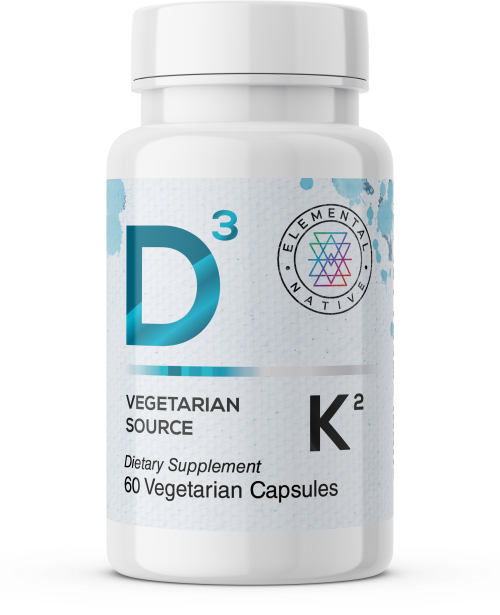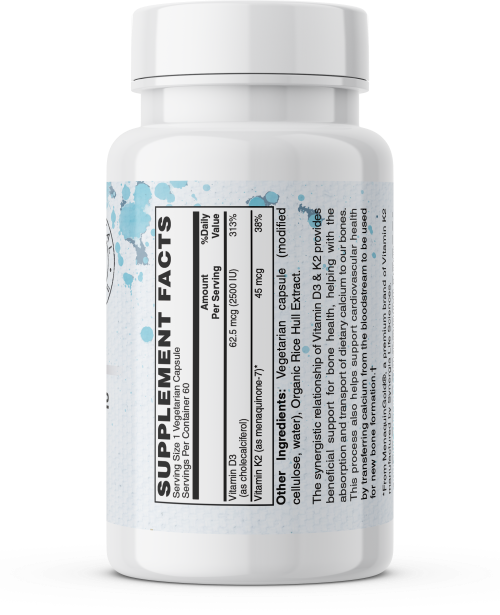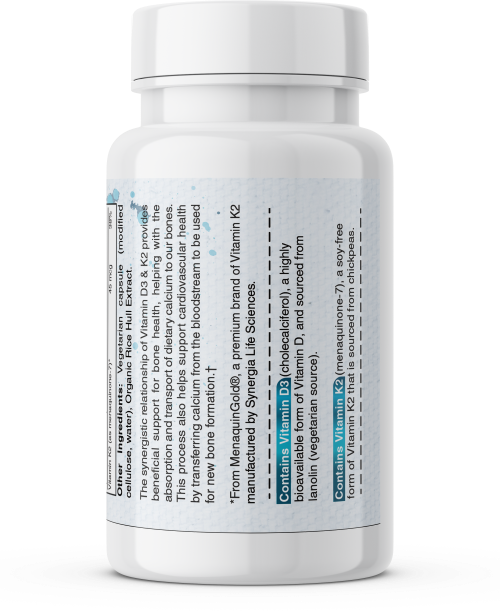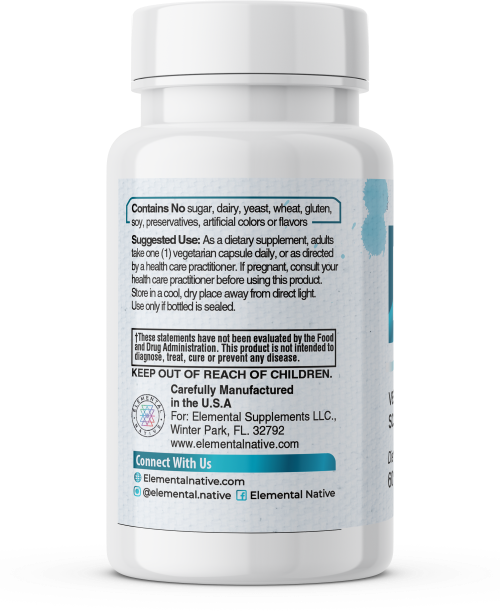-
DETAILS
Current research shows the important synergistic relationship between Vitamin K2 and Vitamin D3. Taking Vitamin D3 with Vitamin K2 helps to ensure the calcium transported by the Vitamin D is absorbed by your bones where it's needed, rather than accumulating in deposits in your arteries.*
A groundbreaking 2017 review compiled over 80 studies that show vitamin D3 and K2 together might be greater than the sum of their parts, when it comes to bone health. This is likely because vitamin D gets the calcium into the blood, then vitamin K tells the calcium where it is most needed. Animal models reveal vitamin K can effectively prevent osteoporosis, but only when paired with vitamin D. Taking vitamin D3 and K2 together actually promotes new bone growth. In 2019, researchers observed that vitamin D3 and K2 worked in tandem to form new osteoblasts, the cells that secrete osteocalcin, which is a biomarker for new bone growth.*
Proper blood levels of vitamin K balance out the high vitamin D levels. Vitamin K2 tells all that calcium intake where it needs to go, and your blood calcium levels are normalized. These vitamins also work in unison to reduce inflammation. Inflammation can lead to not only osteoporosis, but also cardiovascular diseases. Reducing inflammation is beneficial to immune function and heart health. Vitamin D3 and K2 work together in a unique way to soften your arteries and prevent cardiovascular disease.*
Taking vitamin D3 and K2 together reduces insulin resistance. As well as working together as cancer preventatives. Excellent clinical studies show a relationship between low vitamin D level and high risk of cancer. One such study (7) was published in 2007 in the Journal of the National Cancer Institute. In this study, researchers from the National Cancer Institute, USA , investigated if there was any association between vitamin D level and cancer mortality. A total of 16,818 participants in the Third NHANES (National Health And Nutrition Examination Survey) were followed from 1988-1994 through 2000. The researchers found a convincing 72% risk reduction for colorectal cancer mortality if vitamin D levels was 32 ng/ml (80 nmol/L) or higher compared with levels less than 20 ng/ml (50 nmol/L).*
A review (8) from Harvard School of Public Health, USA, was published in the Annals of Epidemiology in 2009. In this paper, the author reported there was about 30% reduction in the risk for breast cancer, comparing the highest with lowest levels of 25 (OH) vitamin D. In addition, vitamin D intake was associated with a lower risk of pancreatic cancer.*
Vitamin K2 appears to be an anti-cancer agent, according to several recent scientific studies. In an experimental study (10) from Tokyo Medical University, Japan, researchers showed that vitamin K2 has anti-cancer properties against leukemia cells in their laboratory. In another experimental study (11) from Tokyo Medical University, Japan, researchers were able to show anti-cancer properties of vitamin K2 in lung cancer cells in their laboratory. In an experimental study (12) from Showa University, Japan, researchers were able to show anti-cancer properties of vitamin K2 against ovarian cancer cells in their laboratory. In an experimental study (13) from Shanghai Jiao Tong University, China, researchers were able to show anti-cancer effects of vitamin K2 in liver cancer cells in their laboratory. In an experimental study (14) from University of Illinois, USA, researchers were able to show anti-cancer effects of vitamin K2 in prostate cancer cells in their laboratory. In another experimental study (15) from Kawasaki Medical School, Japan, researchers showed an inhibitory effect of vitamin K2 on the Multiple myeloma cells. In one more experimental study (16) from Thomas Jefferson University, USA. researchers showed that vitamin K1 as well as K2 were able to inhibit the growth of pancreatic cancer cells in their laboratory.*
In these studies, vitamin K2 was able to either kill cancer cells or stop their further growth or even change their growth into normal cells. These are exciting new studies, although still experimental and done on cancer cells in the laboratory. In any case, vitamin K2 brings a new hope in dealing with cancers. Vitamin K2 does not seem to have any side-effects. It is definitely worth-trying if you are dealing with a cancer.*
-
DIRECTIONS
Suggested Use:
As a dietary supplement, adult take one (1) vegetarian capsule daily, or as directed by a health care practitioner.
-
WHAT'S IN IT
Vitamin D3 (cholecalciferol) is a highly bioavailable form of Vitamin D that is sourced from lanolin (vegetarian source).
Vitamin K2 (menaquinone-7) is a soy-free form of Vitamin K2 that is sourced from chickpeas.
 Non GMO
Non GMO Hormone free
Hormone free Gluten free
Gluten free Dairy free
Dairy free Keto
Keto Paleo
Paleo 0 Sugars
0 SugarsKEY INGREDIENT
D3 + K2
Vitamin D3
-Vitamin D3 (cholecalciferol) is a highly bioavailable form of Vitamin D that is sourced from lanolin (vegetarian source).
Vitamin K2
-Vitamin K2 (menaquinone-7) is a soy-free form of Vitamin K2 that is sourced from chickpeas.
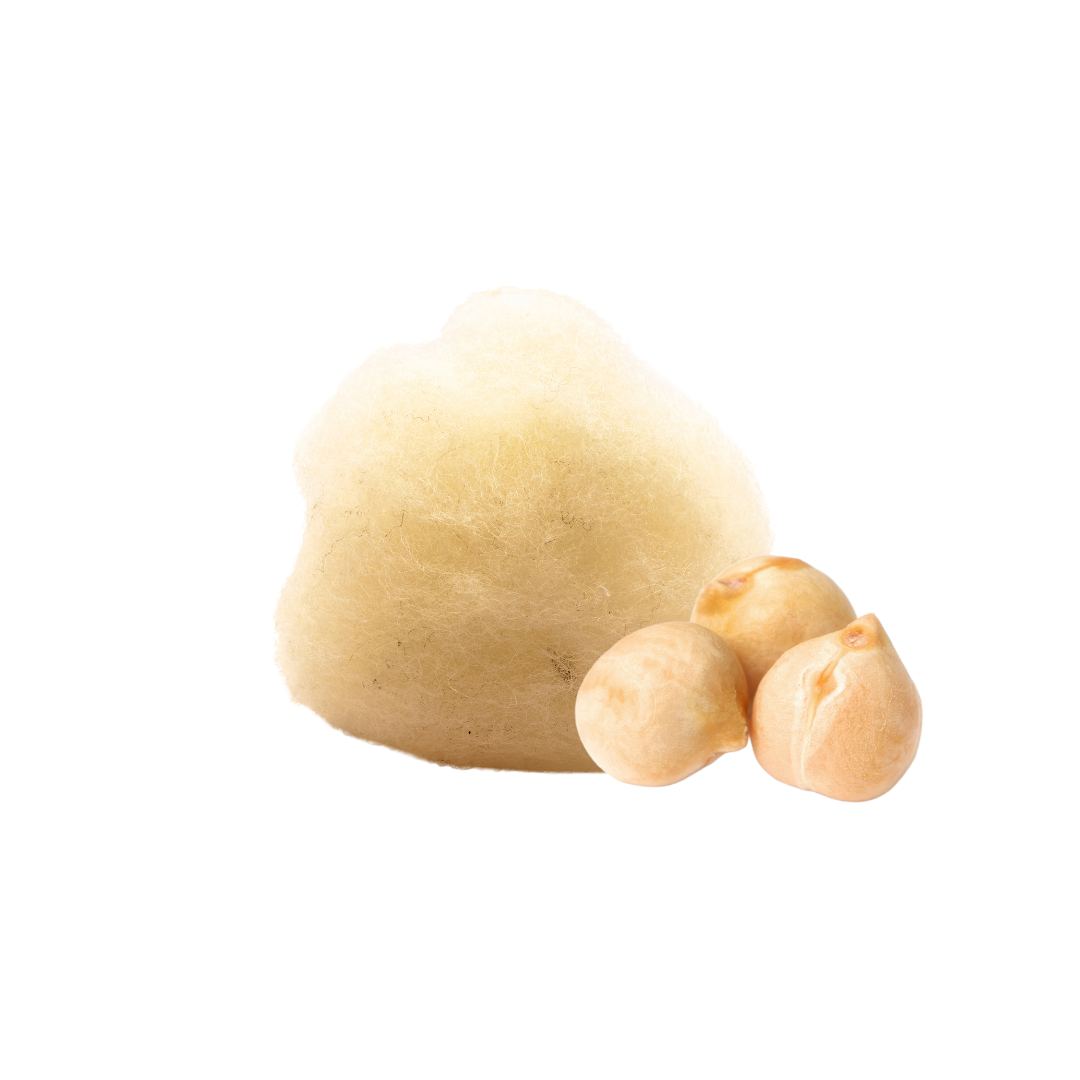
D3+K2 BENEFITS
-
1. Vitamin D3
IMMUNE SYSTEM -
2.Vitamin D3
ANTI-INFLAMMATORY -
3.Vitamin D3
BOOSTS MOOD -
4.Vitamin D3
CARDIOVASCULAR HEALTH -
5. Vitamin K2
REDUCE HEART DISEASE -
6.Vitamin K2
STRENGTHENS BONES
-
Vitamin D's most important functions include supporting the immune system and improving its function. It stimulates T-cell production and aids in the proper response to viral infections, such as the common cold, influenza, and other community-wide illnesses caused by viruses, bacteria, and fungus.*
-
Vitamin D3 is beneficial to the immune system because it helps regulate the production of cytokines. Cytokines are proteins that are used by the immune system to communicate with other cells, and when they are produced in the wrong amounts or at the wrong time, they can cause inflammation.*
Vitamin D3 can also help reduce the risk of infections by promoting the production of white blood cells and increasing the efficiency of T-cells. A lack of Vitamin D3 has been linked to an increased susceptibility to infection, so maintaining healthy levels might help keep you from getting sick.* -
A number of studies have shown that low levels of Vitamin D3, linked to insufficient sunshine exposure, are associated with Seasonal Affective Disorder (SAD) symptoms. SAD is a mood disorder characterized by sadness as the primary symptom. Vitamin D3 levels have been shown to decrease, which has been linked to lower levels of serotonin in the brain, a neurotransmitter that controls emotions. You may improve your mood by taking a Vitamin D3 supplement or increasing your sun exposure.*
-
Vitamin D deficiency has been linked to a variety of heart conditions including high blood pressure, heart disease, congestive heart failure, peripheral arterial disease, strokes, and heart attack. Vitamin D levels can be elevated to help reduce the chance of developing heart illness and its symptoms.*
-
Vitamin K breaks down calcium in our bodies, and this effect helps prevent hard deposits (calcium and fatty material) from forming in artery walls. Smooth and flexible blood vessels ensure healthy circulation, reducing the risk of harmful blood clots and heart disease. Studies show that a person’s risk of dying from heart disease falls by 9% for every 10 micrograms of K2 consumed a day.*
-
Our bodies need calcium to build and maintain bones. When it breaks down calcium in our bodies, vitamin K2 activates a protein that helps the mineral bind to our bones to do its job. While research is ongoing, studies show a higher K2 intake improves bone density and reduces the risk of bone fractures.*

